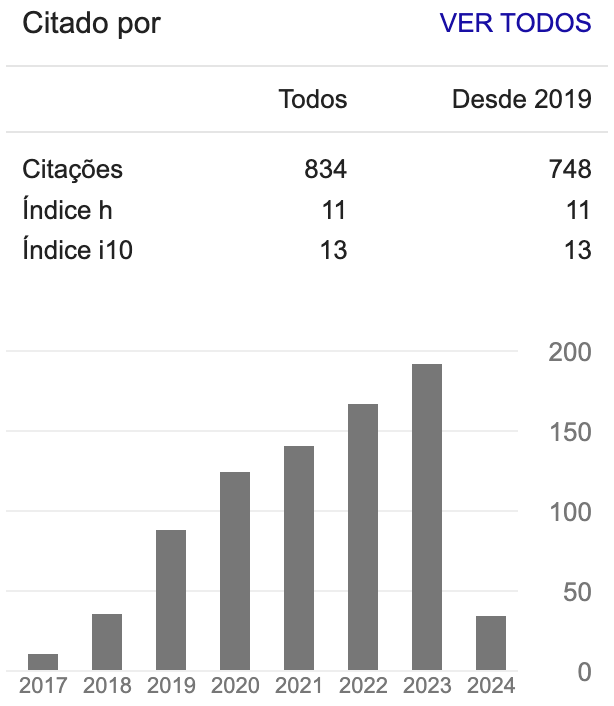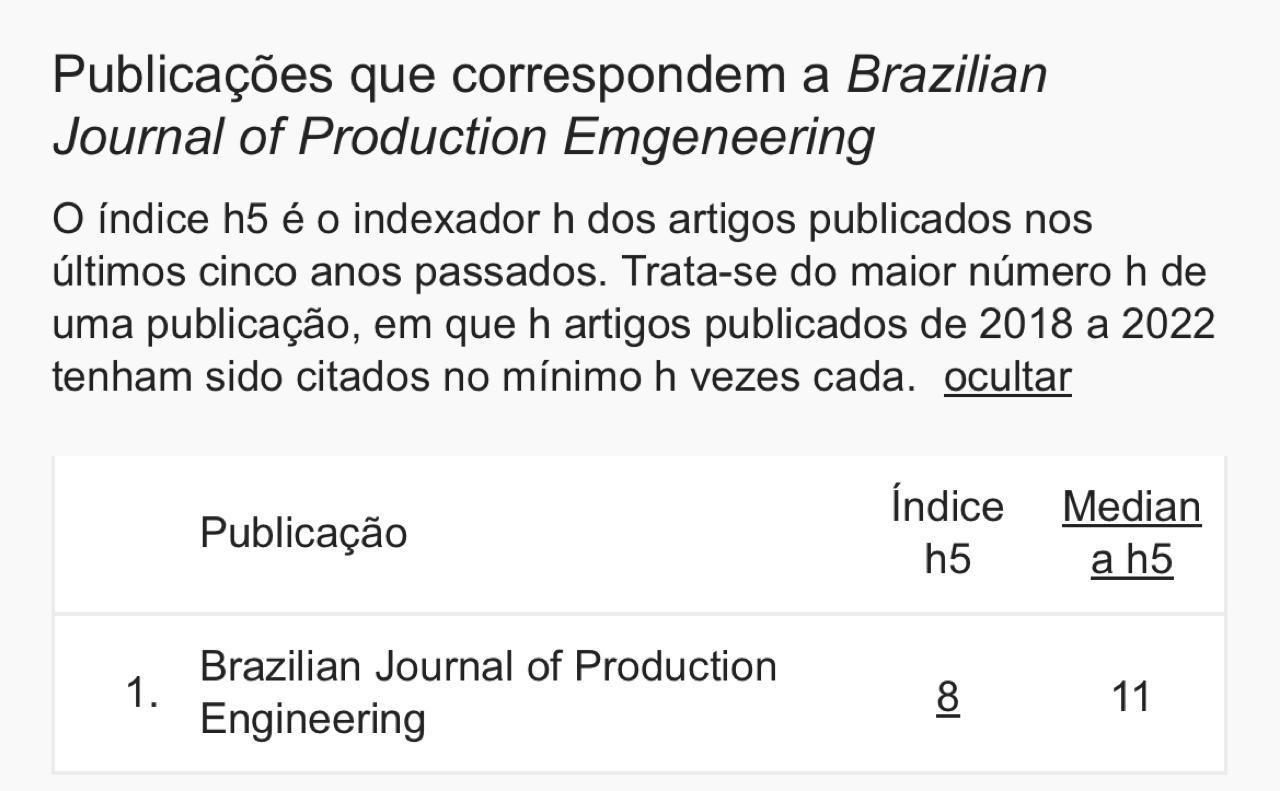Entrepreneurial intent among information systems students: investigating the role of family context, self-employment and gender in undergraduate education
DOI:
https://doi.org/10.47456/bjpe.v7i3.35323Keywords:
Entrepreneurial intention, Information systems students, Family background, Gender, Self-employmentAbstract
This research aims to investigate family background, self-employment, and gender in undergraduate students of information systems. Regarding the approach to the problem, this research is characterized as quantitative and as for the objectives, there is exploratory research. The technical procedure adopted was the case study in information systems students (number of respondents equal to 100). The main results that most students intend to become entrepreneurs in the future: Students who have a family background tend to support entrepreneurship more; and high entrepreneurial behavior in females concerning males. The importance of this study is to indicate how such factors (family background, self-employment, and gender) affect undergraduate students, contributing to the theoretical and managerial aspects of studies in entrepreneurial intention in the context of the Amazonia region.
Downloads
References
Acs, Z. J., Szerb, L., Lafuente, E., & Markus, G. (2020). Global Entrepreneurship Index 2019. The Global Entrepreneurship and Development Institute, 14, 64p. The Global Entrepreneurship and Development Institute. Retrieved from http://thegedi.org/global-entrepreneurship-and-development-index/
Acs, Z. J., Szerb, L., & Lloyd, A. (2018). Global entrepreneurship index 2018. Washington, D.C: The Global Entrepreneurship and Development Institute - GEDI.
Acs, Z. J. et al. (2017). GEDI - Global Entrepreneurship Index 2017. USA: GEDI.
Ahl, H. (2006). Why research on women entrepreneurs needs new directions. Entrepreneurship: Theory and Practice, 30(5), 595–621. https://doi.org/10.1111/j.1540-6520.2006.00138.x
Ajzen, I. (1991). The theory of planned behavior. Organizational Behavior and Human Decision Processes, 50(2), 179–211. https://doi.org/10.1016/0749-5978(91)90020-T
Angel, P., Jenkins, A., & Stephens, A. (2018). Understanding entrepreneurial sucess: a phenomenographic approach. International Small Business Journal, 36(6), 611-636.
Alves, L. R. R., & Bornia, A. C. (2011). Desenvolvimento de uma escala para medir o potencial empreendedor utilizando a Teoria da Resposta ao Item (TRI). Gestao e Producao, 18(4), 775–790. https://doi.org/10.1590/S0104-530X2011000400007
Bagheri, A., & Lope Pihie, Z. A. (2014). The moderating role of gender in shaping entrepreneurial intentions: Implications for vocational guidance. International Journal for Educational and Vocational Guidance, 14(3), 255–273. https://doi.org/10.1007/s10775-014-9269-z
Bako, Y. A., Ajibode, I. A., Oluseye, A. B., & Aladelusi, K. B. (2018). An Investigation of Entrepreneurial Intention Among Entrepreneurship Students in South-West Nigeria Polytechnics. International Journal of Entrepreneurial Knowledge, 5(2), 16–32. https://doi.org/10.1515/ijek-2017-0008
Baumol, W. J., Schilling, M. A., & Wolff, E. N. (2009). The superstar inventors and entrepreneurs: How were they educated? Journal of Economics and Management Strategy, 18, 711–728. https://doi.org/10.1111/j.1530-9134.2009.00227.x
Baumol, W. J. (2010). The microtheory of innovative entrepreneurship. The Microtheory of Innovative Entrepreneurship (pp. 1–246). Princeton University Press. https://doi.org/10.1093/ajae/aar056
Bird, B. (1988). Implementing Entrepreneurial Ideas: The Case for Intention. Academy of Management Review, 13(3), 442–453. https://doi.org/10.5465/amr.1988.4306970
Bloemen-Bekx, M., Voordeckers, W., Remery, C., & Schippers, J. (2019). Following in paretal footsteps? The influence of gender and learning expeeriences on entrepreneurial intentions. International Small Business Journal, 37(6), 642-663.
Bogatyreva, K., Edelman, L. F., Manolova, T. S., Osiyevskyy, O., & Shirokova, G. (2019). When do entrepreneurial intentions lead to actions? The role of national culture. Journal of Business Research, 96, 309–321. https://doi.org/10.1016/j.jbusres.2018.11.034
Bosma, N., et al. (2020). Global Entrepreneurship Monitor: 2019/2020 global report. London, UK: Global Entrepreneurship Research Association.
Bosma, N., Kelley, D. (2019). Global Entrepreneurship Monitor: 2018/2019 global report. London, UK: Global Entrepreneurship Research Association.
Braches, B., & Elliott, C. (2016). Articulating the entrepreneurship carrer: a study of german women entrepreneurs. International Small Business Journal, 35(5), 535-557.
Carayannis, E. G., Evans, D., & Hanson, M. (2003). A cross-cultural learning strategy for entrepreneurship education: Outline of key concepts and lessons learned from a comparative study of entrepreneurship students in France and the US. Technovation, 23(9), 757–771. https://doi.org/10.1016/S0166-4972(02)00030-5
Cassar, G. (2007). Money, money, money? a longitudinal investigation of entrepreneurship career reasons, growth preferences and achieved growth. Entrepreneurship and regional development, 19(1), 822-840.
Esfandiar, K., Sharifi-Tehrani, M., Pratt, S., & Altinay, L. (2019). Understanding entrepreneurial intentions: a developed integrated sctructural model approach. Journal of Business Research, 94, 172-182.
Gupta, V. K., Turban, D. B., Wasti, S. A., & Sikdar, A. (2009). The role of gender stereotypes in perceptions of entrepreneurs and intentions to become an entrepreneur. Entrepreneurship: Theory and Practice, 33(2), 397–417. https://doi.org/10.1111/j.1540-6520.2009.00296.x
Hamilton, E. (2013). The discourse of entrepreneurial masculinities (and femininities). Entrepreneurship and Regional Development, 25(1–2), 90–99. https://doi.org/10.1080/08985626.2012.746879
Hamilton, E. (2006). Whose story is it anyway? Narrative accounts of the role of women in founding and establishing family businesses. International Small Business Journal, 24(3), 253–271. https://doi.org/10.1177/0266242606063432
Harrison, R., Leitch, C., & Mcadam, M. (2015). Breaking Glass: Toward a Gendered Analysis of Entrepreneurial Leadership. Journal of Small Business Management, 53(3), 693–713. https://doi.org/10.1111/jsbm.12180
Hermans, J., Vanderstraeten, J., Van Witteloostuijn, A., Dejardin, M., Ramdani, D., & Stam, E. (2015). Ambitious entrepreneurship: A review of growth aspirations, intentions, and expectations. Advances in Entrepreneurship, Firm Emergence and Growth, 17, 127–160. https://doi.org/10.1108/S1074-754020150000017011
Júnior, E., & Gimenez, F. (2004). Potencial empreendedor: um instrumento para mensuração. Revista de Negócios, 9, 107–116. Retrieved from http://proxy.furb.br/ojs/index.php/rn/article/viewArticle/291
Herdjiono, I., Puspa, Y. H., Maulany, G., & Aldy, B. E. (2018). The Factors Affecting Entrepreneurship Intention. International Journal of Entrepreneurial Knowledge, 5(2), 5–15. https://doi.org/10.1515/ijek-2017-0007
Johara, F., Yahya, S. B., & Tehseen, S. (2017). Determinants of future entrepreneurship and entrepreneurial intention. Global Business and Management Research: an International Journal, 9(4), 80-95.
Kaltenecker, N., Hoerndlein, C., & Hess, T. (2015). The drivers of entrepreneurial intentions - an empirical study among information systems and computer science students. Journal of Entrepreneurship Education, 18(2), 39–52.
Katz, J. A. (1995). Modelling Entrepreneurial Career Progressions: Concepts and Considerations. Entrepreneurship Theory and Practice, 19(2), 23–39. https://doi.org/10.1177/104225879501900203
Kološta, S., Flaška, F., Nedelová, G., Kašcáková, A., Årethun, T., & Gunnar Nesse, J. (2018). Factors Influencing Entrepreneurial Intentions of Slovak Youth Growing up in Cities and in Villages. International Journal of Organizational Leadership, 7(3), 270–283. https://doi.org/10.33844/ijol.2018.60229
Krueger, N. F. (2017). Entrepreneurial Intentions Are Dead: Long Live Entrepreneurial Intentions (pp. 13–34). https://doi.org/10.1007/978-3-319-45544-0_2
Krueger N. F., Reilly, M. D., & Carsrud, A. L. (2000). Competing models of entrepreneural intentions. Journal of business venturing, 15, 411-432.
Kuckertz, A., & Wagner, M. (2010). The influence of sustainability orientation on entrepreneurial intentions - Investigating the role of business experience. Journal of Business Venturing, 25(5), 524–539. https://doi.org/10.1016/j.jbusvent.2009.09.001
Lapponi, J. C. (2005). Estatística usando Excel. Rio de Janeiro: Elsevier.
Laspita, S., Breugst, N., Heblich, S., & Patzelt, H. (2012). Intergenerational transmission of entrepreneurial intentions. Journal of Business Venturing, 27(4), 414–435. https://doi.org/10.1016/j.jbusvent.2011.11.006
Liang, C. T., & Liang, C. (2015). Interaction of psychological factors in shaping entrepreneurial intention among computer and eletrical engineering students. Journal of entrepreneurship, management and innovation, 11(2), 5-30.
Lopes Junior, G. S., & Sousa E. C. L. (2005). Atitude empreendedora em proprietários-gerentes de pequenas empresas: construção de um instrumento de medida. REAd, 11(6).
Marconi, M. A., & Lakatos, E. M. (2002). Técnicas de pesquisa: planejamento e execução de pesquisas, amostragens e técnicas de pesquisa, elaboração, analise e interpretação de dados. 5. Ed. São Paulo: Atlas.
Marlow, S., & McAdam, M. (2013). Gender and entrepreneurship: advancing debate and challenging myths: exploring the mistery of the under-performing female entrepreneur. International Journal of Entrepreneurial Behavior and Research, 19(1), 114-124.
Omidi Najafabadi, M., Zamani, M., & Mirdamadi, M. (2016). Designing a model for entrepreneurial intentions of agricultural students. Journal of Education for Business, 91(6), 338–346. https://doi.org/10.1080/08832323.2016.1218318
Nguyen, C. (2018). Demographic factors, family background and prior self-employment on entrepreneurial intention - Vietnamese business students are different: why? Journal of Global Entrepreneurship Research, 8(1). https://doi.org/10.1186/s40497-018-0097-3
Obschonka, M., Silbereisen, R. K., & Schmitt-Rodermund, E. (2016). Entrepreneurial intention as development outcome. IEEE Engineering Management Review, 44(1), 92–92. https://doi.org/10.1109/emr.2016.7448789
Osakede, U. A., Lawanson, A. O., & Sobowale, D. A. (2017). Entrepreneurial interest and academic performance in Nigeria: evidence from undergraduate students in the University of Ibadan, Journal of Innovation and Entrepreneurship, 6, 1-15.
Palmer, C., Fasbender, U., Kraus, S., Birkner, S., & Kailer, N. (2021). A chip off the old block? The role of dominance and parental entrepreneurship for entrepreneurial intention. Review of Managerial Science, 15(2), 287–307. https://doi.org/10.1007/s11846-019-00342-7
Randolph, R. V., Li, Z., & Daspit, J. J. (2019). Toward a Typology of Family Firm Corporate Entrepreneurship. Journal of Small Business Management, 57(3), 1102–1118. https://doi.org/10.1111/jsbm.12421
Rodrigues, A. P., Jorge, F. E., Pires, C. A., & António, P. (2019). The contribution of emotional intelligence and spirituality in understandind creativity and entrepreneurial intention of higher education students. Education + Training, 61(7/8), 870-894.
Santos, P. C. F. (2008). Uma escala para identificar potencial empreendedor. 2008. 364 f. Tese (Doutorado em Engenharia de Produção)-Universidade Federal de Santa Catarina, Florianópolis, 2008.
Schumpeter, J. A. (1997). Teoria do desenvolvimento econômico. São Paulo: Nova Cultural.
Schumpeter, J. A. (1961). Capitalismo, socialismo e democracia. Rio de Janeiro: Fundo de cultura.
Sesen, H. (2013). Personality or environment? A comprehensive study on the entrepreneurial intentions of university students. Education + Training, 55(7), 624–640. https://doi.org/10.1108/ET-05-2012-0059
Shapero, A. (1982). Social Dimensions of Entrepreneurship. In C. Kent, D. Sexton and K. Vesper, eds., The Encyclopedia of Entrepreneurship. Englewood Cliffs: Prentice-Hall, 72–90.
Shinnar, R. S., Hsu, D. K., Powell, B. C., & Zhou, H. (2018). Entrepreneurial intentions and start-ups: Are women or men more likely to enact their intentions? International Small Business Journal: Researching Entrepreneurship, 36(1), 60–80. https://doi.org/10.1177/0266242617704277
Shirokova, G., Osiyevskyy, O., & Bogatyreva, K. (2016). Exploring the intention–behavior link in student entrepreneurship: Moderating effects of individual and environmental characteristics. European Management Journal, 34(4), 386–399. https://doi.org/10.1016/j.emj.2015.12.007
Shook, C. L., & Bratianu, C. (2010). Entrepreneurial intent in a transitional economy: na application of the theory of planned behavior to romanian students. IntEntrepManag J, 6, 231-247.
Silva, E. L., & Menezes, E. M. (2005). Metodologia da pesquisa e elaboração de dissertação. 4. ed. Florianópolis: UFSC.
Silvestre, A. L. (2007). Análise de dados e estatística descritiva. Lisboa/Portugal: Escola Editora.
Souitaris, V., Zerbinati, S., & Al-Laham, A. (2007). Do entrepreneurship programmes raise entrepreneurial intention of science and engineering students? The effect of learning, inspiration and resources. Journal of Business Venturing, 22(4), 566–591. https://doi.org/10.1016/j.jbusvent.2006.05.002
Veciana, J. M., Aponte, M., & Urbano, D. (2005). University Students’ Attitudes Towards Entrepreneurship: A Two Countries Comparison. The International Entrepreneurship and Management Journal, 1(2), 165–182. https://doi.org/10.1007/s11365-005-1127-5
Vieira, F. D., & Rodrigues, C. S. (2014). Os estudantes de engenharia e as suas intenções empreendedoras. Revista Produção Online, 14(1), 242. https://doi.org/10.14488/1676-1901.v14.i1.1588
Wang, C. K., & Wong, P. K. (2004). Entrepreneurial interest of university students in Singapore. Technovation, 24(2), 163–172. https://doi.org/10.1016/S0166-4972(02)00016-0
Weiss, J., Anisimova, T., & Shirokova, G. (2019). The translation of entrepreneurial intention into start-up behaviour: The moderating role of regional social capital. International Small Business Journal: Researching Entrepreneurship, 37(5), 473–501. https://doi.org/10.1177/0266242619831170
Wilson, F., Kickul, J., & Marlino, D. (2007). Gender, entrepreneurial self-efficavy, and entrepreneurial career intentions: implications for entrepreneurship education. Entrepreneurship Theory and Practice, 31(3), 387-406.
Yin, R. K. (1994). Case Study Research, Design and Methods, 2nd ed. Newbury Park, Sage Publications.
Downloads
Published
How to Cite
Issue
Section
License
Copyright (c) 2021 Brazilian Journal of Production Engineering - BJPE

This work is licensed under a Creative Commons Attribution-NonCommercial-ShareAlike 4.0 International License.
Atribuição-NãoComercial-CompartilhaIgual
CC BY-NC-SA
This license lets others remix, adapt, and build upon your work non-commercially, as long as they credit you and license their new creations under the identical terms.






































































